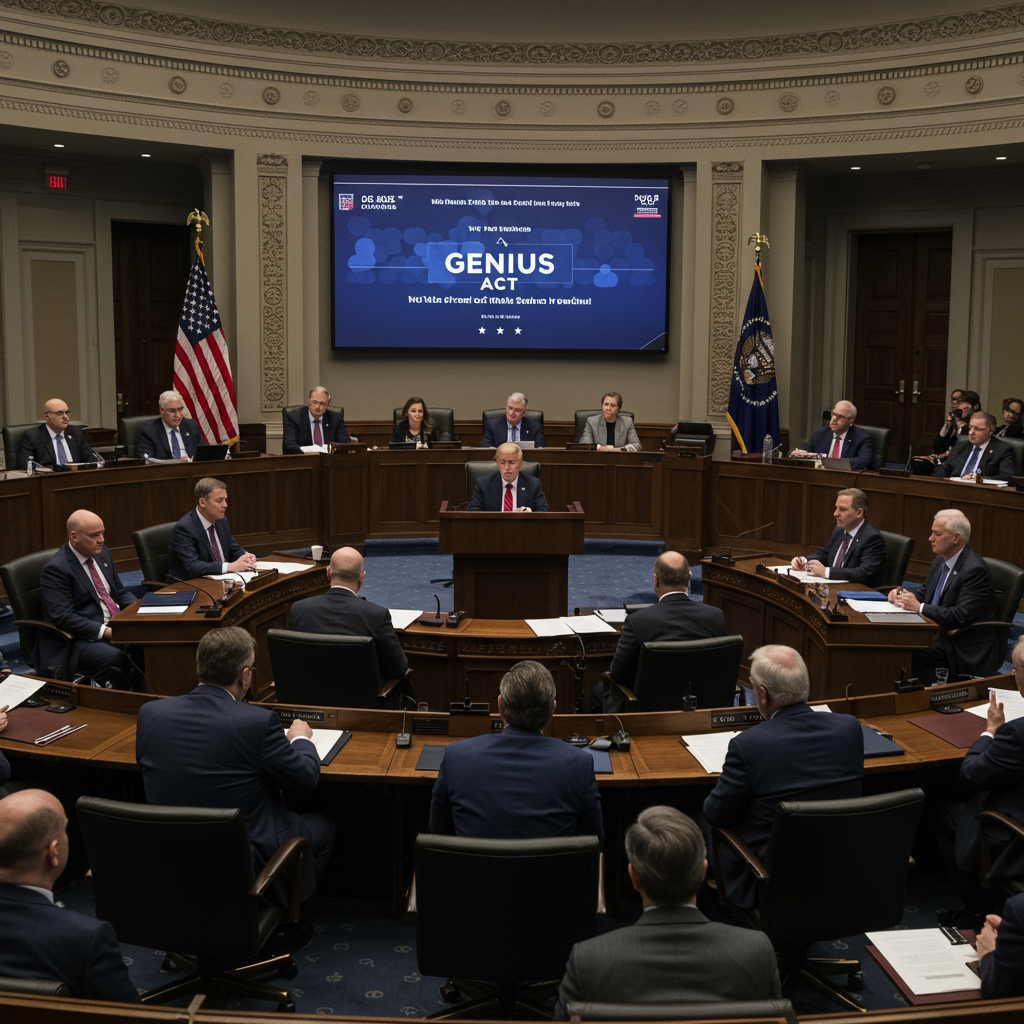Senate Approves Landmark Stablecoin Bill Amidst Debate Over Presidential Conflicts
WASHINGTON, D.C. – In a significant move for the burgeoning digital asset market, the U.S. Senate on Tuesday passed the GENIUS Act, legislation aimed at establishing a regulatory framework for stablecoins. The bill, considered the first major piece of crypto regulation to advance through Congress, is intended to bolster the industry’s legitimacy and enhance consumer protections.
The measure, which passed with a decisive 68-30 vote, now heads to the House of Representatives for further consideration. While celebrated by proponents as a crucial step forward, its passage comes alongside unresolved concerns regarding potential conflicts of interest involving President Donald Trump’s growing financial stake in the cryptocurrency space.
What is the GENIUS Act?
Formally known as the Guiding and Establishing National Innovation for U.S. Stablecoins Act, the GENIUS Act focuses specifically on stablecoins. These cryptocurrencies are typically pegged to existing assets like the U.S. dollar, aiming to offer stability not found in more volatile digital assets like Bitcoin.
The bill seeks to create essential guardrails and consumer protections for stablecoin use, a move supporters argue is necessary to integrate this technology safely into the mainstream financial system.
Senator Bill Hagerty (R-Tenn.), the bill’s sponsor, described the legislation as a “paradigm shifting development” with “far reaching implications” for the financial system, believing it positions the U.S. closer to being a “global leader in crypto.”
Bipartisan Support Meets Steep Opposition
The GENIUS Act saw notable bipartisan support in the Senate, with eighteen Democratic senators crossing the aisle to vote alongside the Republican majority. This cooperation underscores the crypto industry’s increasing political influence in Washington, particularly following significant spending in the 2024 election cycle. It marks the second major bipartisan bill to pass the Senate this year.
However, the bill faced considerable opposition, primarily from Democrats who voiced concerns that the legislation fails to adequately address President Trump’s personal financial interests in crypto. While Republican Senators Josh Hawley of Missouri and Rand Paul of Kentucky were the only members of their party to vote against the measure, most Democrats opposed it.
Senator Angela Alsobrooks (D-Md.), a co-sponsor, acknowledged the challenges during negotiations, stating that while they weren’t able to include everything desired, it was a “good bipartisan effort” to regulate a previously “unregulated area.”
The Unresolved Trump Conflict
A central point of contention is a provision within the bill that bans members of Congress and their families from profiting directly off stablecoins, but conspicuously does not extend this prohibition to the president or their family.
This exemption has drawn sharp criticism, especially given President Trump’s increasingly public embrace of the crypto industry and his substantial reported holdings. Recent activities include hosting a private dinner with investors in a Trump-branded meme coin. His family also holds a significant stake in World Liberty Financial, a crypto project that has launched its own stablecoin, USD1.
According to a recent public financial disclosure, President Trump reported earning $57.35 million from token sales at World Liberty Financial in 2024. Estimates suggest a related meme coin has generated roughly $320 million in fees, though these earnings are split among multiple investors.
Critics like Senator Elizabeth Warren (D-Mass.), the ranking member on the Senate Banking Committee, have been outspoken opponents, warning the bill creates a “super highway” for potential corruption linked to Trump’s holdings. Senator Warren has also expressed concerns that the legislation could pave the way for major technology companies like Amazon and Meta to launch their own stablecoins.
Despite these concerns, the Trump administration has generally signaled support for the growth of crypto. Treasury Secretary Scott Bessent indicated the legislation could help the U.S. stablecoin market reach trillions of dollars by the end of the decade. Industry leaders, including Coinbase CEO Brian Armstrong, have met with Trump and advocated for the bill.
Navigating Legislative Hurdles
The GENIUS Act’s path to passage wasn’t entirely smooth. Although described as fast-moving, it encountered resistance, including a temporary setback in early May when a bloc of Democrats withdrew support. This prompted renewed negotiations involving Republicans, Democrats, and the White House, ultimately yielding the compromise version that passed Tuesday.
Even among co-sponsors, the final bill wasn’t met with universal enthusiasm. Senator Cynthia Lummis (R-Wyo.) stated she was “okay” with the final version but “not thrilled.”
What’s Next: The House Challenge
With Senate passage secured, the GENIUS Act now faces significant hurdles in the House of Representatives, where the Republican majority is narrow. There is also the potential for House lawmakers to attempt attaching the stablecoin bill to broader market structure legislation, which could complicate its eventual passage through the Senate.
President Trump has reportedly expressed a desire for stablecoin legislation to reach his desk before Congress departs for its August recess, just weeks away.
The Senate’s approval marks a critical moment for crypto regulation in the U.S., bringing stablecoins under a new federal framework. However, the debate over the bill’s scope and its failure to address potential conflicts of interest at the presidential level is likely to continue as it advances through the legislative process.


